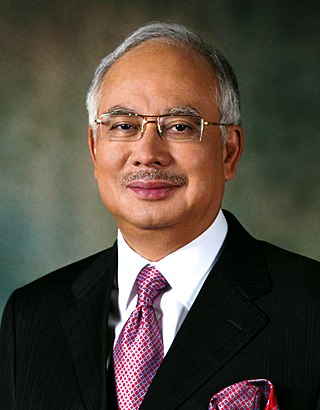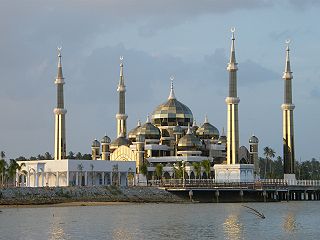A fuel tax is an excise tax imposed on the sale of fuel. In most countries the fuel tax is imposed on fuels which are intended for transportation. Fuel tax receipts are often dedicated or hypothecated to transportation projects, in which case the fuel tax can be considered a user fee. In other countries, the fuel tax is a source of general revenue. Sometimes, a fuel tax is used as an ecotax, to promote ecological sustainability. Fuel taxes are often considered by government agencies such as the Internal Revenue Service as regressive taxes.

Liquefied petroleum gas is a fuel gas which contains a flammable mixture of hydrocarbon gases, specifically propane, propylene, butylene, isobutane, and n-butane.

Dato' Sri Haji Mohammad Najib bin Tun Haji Abdul Razak is a Malaysian politician who served as the 6th prime minister of Malaysia from April 2009 to May 2018. In 2020, he was convicted of corruption in the 1Malaysia Development Berhad scandal, one of the largest money-laundering and embezzlement scandals in history. He is the son of former prime minister Abdul Razak Hussein. Najib Razak was the chairman of the Barisan Nasional (BN) coalition from April 2009 to May 2018 and the president of the United Malays National Organisation (UMNO) from November 2008 to May 2018, which had maintained control of Malaysia's government with a parliamentary majority for more than sixty years until the coalition's defeat in the 2018 general election.

Autogas or LPG is liquefied petroleum gas (LPG) used as a fuel in internal combustion engines in vehicles as well as in stationary applications such as generators. It is a mixture of propane and butane.

The usage and pricing of gasoline results from factors such as crude oil prices, processing and distribution costs, local demand, the strength of local currencies, local taxation, and the availability of local sources of gasoline (supply). Since fuels are traded worldwide, the trade prices are similar. The price paid by consumers largely reflects national pricing policy. Most countries impose taxes on gasoline (petrol), which causes air pollution and climate change; whereas a few, such as Venezuela, subsidize the cost. Some country's taxes do not cover all the negative externalities, that is they do not make the polluter pay the full cost. Western countries have among the highest usage rates per person. The largest consumer is the United States.
The energy policy of India is to increase the locally produced energy in India and reduce energy poverty, with more focus on developing alternative sources of energy, particularly nuclear, solar and wind energy. Net energy import dependency was 40.9% in 2021-22.
The 2007 gasoline rationing plan in Iran was launched by president Mahmoud Ahmadinejad's cabinet to reduce that country's fuel consumption. Although Iran is one of the world's largest producers of petroleum, rapid increases in demand and limited refining capacity have forced the country to import about 40% of its gasoline, at an annual cost of up to USD $7 billion.

This article lists important figures and events in Malaysian public affairs during the year 2008, together with the deaths of notable Malaysians.
The main fuel tax in Australia is an excise tax, to which Goods and Services Tax ("GST") is added. Both taxes are levied by the federal government. In Australia the GST is applied on top of the fuel excise tax. In some cases, businesses may be entitled to exemptions or rebates for fuel excise tax, including tax credits and certain excise-free fuel sources.

The use of biofuels varies by region. The world leaders in biofuel development and use are Brazil, United States, France, Sweden and Germany.
1Malaysia was a political slogan coined by Malaysian former Prime Minister Najib Tun Razak in 2009, with the stated goal of promoting ethnic harmony, national unity, and efficient governance.
The economic policy of the Najib Razak government marked a shift away from the state-oriented economic programmes of previous Malaysian governments. Najib Razak's government introduced various policies to liberalise the economy during his premiership from 2009 to 2018. This included a New Economic Model, subsidy reforms, international free trade agreements and stimulus packages. However, in the later stages of his administration, Malaysia experienced an economic downturn and a depreciation of the Malaysian Ringgit due to the 1Malaysia Development Berhad scandal (1MDB).
Malaysia's National Broadband Initiative is a government programme designed to make high-speed Internet accessible and affordable to the country's citizens, with a special emphasis on rural areas, children and the poor. The public-private partnership, announced by Prime Minister Najib Tun Razak on March 24, 2010, combines the efforts of the Malaysian Communications and Multimedia Commission and Telekom Malaysia.
Ops Turun is an anti-price hike rally that was held in Kuala Lumpur, Malaysia on December 31, 2013. The rally was organised by non-government organisations Gerakan Turun Kos Sara Hidup (Turun) and Gerakan3112 in response to the Malaysian government raising prices of essential foodstuffs, fuel and toll rates. At the same time the opposition highlighted the inadequate salary increments, corruption and illicit outflow of funds from Malaysia.

The following lists events from 2015 in Malaysia.

Events in 2016 in Malaysia.
The Malaysian federal budget for 2015 fiscal year was presented to the Dewan Rakyat by Prime Minister and Minister of Finance, Najib Razak on Friday, 10 October 2014.
The Malaysian federal budget for 2014 fiscal year was presented to the Dewan Rakyat by Prime Minister and Minister of Finance, Najib Razak on Friday, 25 October 2013.
Give Up LPG Subsidy is a campaign that was launched in March 2015 by the Indian government led by Prime Minister Narendra Modi. It is aimed at motivating LPG users who are able to afford to pay the market price for LPG to voluntarily surrender their LPG subsidy. As of 23 April 2016, 10 million people had voluntarily given up the subsidy. The surrendered subsidy is being redistributed by the government in order to provide cooking gas connections to poor families in rural households free of cost. Maharashtra, Uttar Pradesh, Karnataka, Delhi and Tamil Nadu are the top five states to give up the subsidy.

Pradhan Mantri Ujjwala Yojana was launched by Prime Minister of India Narendra Modi on 1 May 2016 to distribute 50 million LPG connections to women of Below Poverty Line (BPL) families. A budgetary allocation of ₹80 billion (US$1.0 billion) was made for the scheme. The scheme was replaced by the Ujjwala Yojana 2.0 in 2021.










